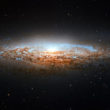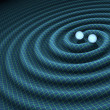5 Reasons Why the Universe Can’t Be Merely a Brute Fact
by Karlo Broussard
Filed under Cosmology

Can the universe be a mere brute fact? Can we say, “The universe just exists and that’s that—it has no explanation at all”? Sean Carroll, a theoretical physicist at the California Institute of Technology, thinks so. In a recent interview at Salon.com, Carroll says, “There’s certainly no reason to think that there was something that ‘caused’ it; the universe can just be.” Carroll is in good company with such an assertion. Bertrand Russell, the late British atheistic philosopher,... Read More
Answering Stephen Colbert’s Favorite Atheist Physicist
by Trent Horn
Filed under Atheism, Christianity and Science, Cosmology

In a book that was released a few days ago, Sean Carroll, theoretical physicist, critic of religion, and former guest of The Colbert Report, presents what he calls The Big Picture. Neil deGrasse Tyson says the book “weav[es] the threads of astronomy, physics, chemistry, biology, and philosophy into a seamless narrative tapestry. Sean Carroll enthralls us with what we’ve figured out in the universe and humbles us with what we don’t yet understand. Yet in the end, it’s the meaning... Read More
The Ultimate Jeopardy Question
by Dr. Chad Engelland
Filed under Cosmology, The Existence of God

“Why is there something rather than nothing?” In The Grand Design (2010), Stephen Hawking made headlines by denying the need for God to get matter to jump into being; the law of gravity was enough to do it. Then, Lawrence Krauss created a Youtube sensation and book called, A Universe from Nothing: Why There Is Something Rather than Nothing (2012), that made the same case, including an afterward by Richard Dawkins who heralded it as a death blow to the last proof for the existence of... Read More
10 Keys on Faith and Science for Christians and Atheists
by Dr. Stacy Trasancos
Filed under Christianity and Science

On one hand, there are marvelous discourses in institutions of higher learning about the ways theology illuminates scientific ideas and, likewise, how science deepens faith. Theologians, philosophers, and scientists come together and talk, even if everyone is not a person of faith. On the other hand, the public presentation of faith and science, mostly on the internet, is a tale of incessant conflict because anyone can pose as an expert on religion or science, despite being nonreligious... Read More
Do Theological Claims Need to be Falsifiable?
by Dr. Edward Feser
Filed under Belief, Christianity and Science

Antony Flew’s famous 1950 article “Theology and Falsification” posed what came to be known as the “falsificationist challenge” to theology. A claim is falsifiable when it is empirically testable—that is to say, when it makes predictions about what will be observed under such-and-such circumstances such that, if the predictions don’t pan out, the claim is thereby shown to be false. The idea that a genuinely scientific claim must be falsifiable had already been given currency... Read More
Why Miracles Are Not Incompatible with Science
by Karlo Broussard
Filed under Christianity and Science

Skeptics argue that miracles are impossible because the laws of nature are necessary. A miracle, they argue, involves a violation of a law of nature. But the laws of nature cannot be violated. Therefore, miracles must be impossible. One modern skeptic of repute who argues this is Richard Dawkins. In his book The God Delusion, he says, “[M]iracles, by definition, violate the principles of science” (83). Dawkins and other modern skeptics derive this argument from philosophers in the... Read More
Bill Nye is Not the Philosophy Guy
by Bishop Robert Barron
Filed under Science

Reliable sources have informed me that for the millennial generation Bill Nye is a figure of great importance, due to his widely-watched program from the 1990’s called “Bill Nye the Science Guy.” Evidently, he taught a large swath of American youth the fundamentals of experimental science and became for them a sort of paragon of reason. Well, I’ll take their word for it. But judging from a recent video in which Bill Nye discussed the relation between science and philosophy, I can... Read More
Why the First Verified Detection of Gravitational Waves is HUGE News
by Fr. Robert Spitzer
Filed under Science

Now that LIGO (Laser Interferometer Gravity-wave Observatory) scientists have published their research in the scientific journal Physical Review Letters, the media is abuzz with the news of gravitational waves. It is difficult to overstate the importance of this announcement. To begin with, gravitational waves were (until now) the only major prediction of Einstein’s General Theory of Relativity that still lacked observational evidence. Because LIGO’s measurements align precisely with... Read More
Is Real Knowledge Only Scientific Knowledge?
by Karlo Broussard
Filed under Science

Is science the only legitimate form of rational inquiry? The evolutionary biologist and popular atheist Richard Dawkins thinks so. In a 2012 debate with Rowan Williams, the former Archbishop of Canterbury, Dawkins claims that religion, as opposed to science, is “a betrayal of the intellect.” He asserts that appealing to God to explain the universe is “a phony substitute for an explanation” and “peddles false explanations where real explanations could have been offered.” What... Read More
Does Science Make God Irrelevant?
by Karlo Broussard
Filed under Christianity and Science

Does God still matter? This is the question that seems to be at the heart of the modern debate about God’s existence. Many unbelievers who label themselves agnostic-atheists do not claim definitively that God does not exist. They take the softer position that God probably does not exist, and even if he does exist, he is irrelevant in explaining the universe. As Dr. Richard Dawkins stated in a 2013 Cambridge debate with the former Archbishop of Canterbury, Dr. Rowan Williams, “Religion... Read More






